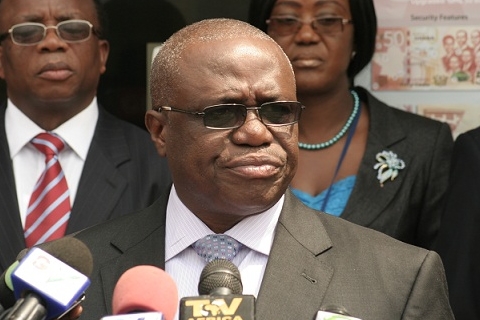Central Bank Governor Henry Kofi Wampah has called Ghana “a victim of its own success” because its middle-income status makes it difficult to borrow on concessional terms.
According to him, the country has to now utilise more commercial debt facilities to finance government budget deficits.
Delivering the keynote address to policymakers, academics and researchers gathering in Accra this week for the Africa Growth Forum 2014, the Governor, who used his speech to situate the country’s problems within an African context, said Ghana is currently experiencing the pains of transitioning from a low- income classification to a middle-income status.
After graduating to the middle-income bracket four years ago, Ghana’s maximum tenor of loans from the World Bank was reduced from 40 years to 25 years, he said, and with grants from foreign donors not keeping up with their pledges, the country has increased its use of international capital markets to raise development finance.
He said a new area where governments in Africa like Ghana’s need evidence-based policy guidance is how to manage the transition from low- income to middle-income status a process that is fraught with both challenges and opportunities.
He also said for Ghana and other sub-Saharan African nations, one of the key quandaries in contemporary times is how to sustain relatively brisk economic growth – in Ghana’s case averaging 7.3 percent annually from 2003-13 – while translating it into jobs for an ever-demanding population.
A second dilemma that confronts governments within the region is how to meet the demands of their people without dislocating tight fiscal budgets, he added.
“The onus rests on us as policymakers to find the solutions [to these problems],” he told the delegates of the forum, which is being organised by the Internatiorial Growth Centre (IGC) together with the Ministry of Finance and the Bank of Ghana.
The IGC is a UK government-funded research institute hosted jointly by the London School of Economics and Oxford University. It conducts research in 14 developing countries including Ghana and nine other sub- Saharan African countries. The IGC provides policy advice to the governments of these countries.
Cassiel Ato Forson, a Deputy Minister of Finance, explained to delegates the structural causes of the country’s large budget deficits, which have since two years ago been hurting the economy’s reputation as a stable place to invest international private capital.
He spoke about the “rigidities” imposed on the government’s budget by statutory resource allocations and quasi-statutory expenditure such as wages and interest payments.
Taken together, public expenditure on wages, interest, tax exemptions and mandatory transfers to statutory funds is worth more than the total domestic revenue collected, meaning the government must necessarily borrow to finance a part of the recurrent budget and the entire capital budget.
These rigidities are currently being managed by the Ministry of Finance, and are the reason that critical resource allocations to some statutory funds sometimes have to be delayed.
In the medium-term, government aims to bring down the cost of wages – the biggest burden on the budget currently – to around 35 percent of tax revenue, while it continues to diversify its borrowing sources and mix of debt instruments to allow for a reduction in debt service costs.
Government is also unwavering in its determination to cut the budget deficit to a more sustainable ratio, Mr. Forson said, adding that while the short-term outlook is challenging, the medium-term prospects of the country are excellent.
Source: Source: BFT


